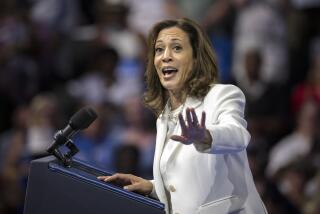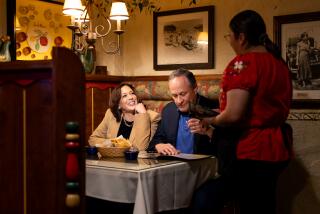Jazz Review : Gene Harris Serves His Blues-Plate Special
- Share via
COSTA MESA — Gene Harris doesn’t like to stray far from home. That’s not to say the renowned keyboardist and confirmed homebody doesn’t travel the world with his quartet, big band or as a soloist.
But when he performs, Harris is most at home with the blues. And no matter how somber the ballad, how upbeat the be-bop tune or how infectious the pop ditty he’s playing, Harris stays close to home, injecting the blues into everything he presents.
So it was no surprise Sunday afternoon at the Robert B. Moore Theatre at Orange Coast College that Harris, after announcing he would “ease” into the program with his quartet and play some blues later in the show, turned the first number, the melancholy “The Trouble With Hello Is Goodby,” into a showcase for his blues-drenched keyboard ways.
Here and elsewhere during the performance Harris displayed his signature touches: rolling barrelhouse lines, lots of flatted fifth accents (the “blue note”) and dynamic swings that ranged from softly spoken phrases to shout chords.
No matter what the tune, Harris made his bluesy approach work. Of the least likely numbers in which this technique succeeded was Chuck Mangione’s “Children of Sanchez,” the Latin-inflected, melodic theme that was made all the more poignant by Harris’ take-it-to-church attack.
The standard jazz tunes Harris chose, such as Thelonious Monk’s “Straight No Chaser” and Sonny Rollins’ “Oleo,” were perfect vehicles for Harris’ style and he filled them with an almost gospel-hall excitement. Straight blues tunes like “C.C. Rider” found Harris at his crowd-pleasing best.
Harris’ foil in this approach was guitarist Ron Eschete, who proved himself capable of bending a few notes himself. Eschete’s style, though, is more direct. As a soloist, he strings together long, lyrical phrases that occasionally break off into dissonant counterpoints. His tones are clear and precise, but this finely cut style doesn’t stop him from proceeding at breakneck speeds.
*
Eschete is also clever at dropping themes from other songs as he purrs along. On this afternoon, he was heard to quote from “Bernie’s Tune,” “Eleanor Rigby” and “Salt Peanuts,” among others. Each fit hand-in-glove inside the musical context.
The afternoon’s best-received quotation came from bassist Luther Hughes, whose “Oleo” improvisation metamorphosed into “The Flintstones” theme. Hughes gave solid support throughout the show, whether called upon for sensitive backing or gut-bucket pluck. His solos, often employing his instrument’s upper range, were crisp, fleet and full of musical content.
Drummer Paul Humphrey provided adequate, to-the-beat timekeeping and rattling improvs that kept his three partners jumping. Humphrey used brushes, sticks and his bare hands during the course of “Straight No Chaser,” giving his presentation harmonic as well as rhythmic weight.
*
The foursome seemed to peak just before the first intermission with an upbeat medley that opened with George Gershwin’s “Summertime.” It never reached that pitch again during the performance’s second half, which opened with a “clean, polite” (as Harris described it) version of “By-By Blues.”
Show-closing presentations of “Funky Gene’s” and a flag-waving rendition of “Battle Hymn of the Republic,” though vibrant with blues and gospel feel, were something less than the big-win excitement that one expects from the dynamic keyboardist. But the first set was a sure winner.
More to Read
The biggest entertainment stories
Get our big stories about Hollywood, film, television, music, arts, culture and more right in your inbox as soon as they publish.
You may occasionally receive promotional content from the Los Angeles Times.








